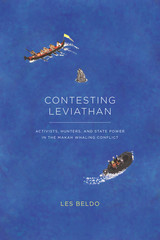
In Contesting Leviathan, anthropologist Les Beldo describes the complex judicial and political climate for whale conservation in the United States, and the limits of the current framework in which whales are treated as “large fish” managed by the National Marine Fisheries Service. Emphasizing the moral dimension of the conflict between the Makah, the US government, and antiwhaling activists, Beldo brings to light the lived ethics of human-animal interaction, as well as how different groups claim to speak for the whale—the only silent party in this conflict. A timely and sensitive study of a complicated issue, this book calls into question anthropological expectations regarding who benefits from the exercise of state power in environmental conflicts, especially where indigenous groups are involved. Vividly told and rigorously argued, Contesting Leviathan will appeal to anthropologists, scholars of indigenous culture, animal activists, and any reader interested in the place of animals in contemporary life.

The Makah Indians was first published in 1953. Minnesota Archive Editions uses digital technology to make long-unavailable books once again accessible, and are published unaltered from the original University of Minnesota Press editions.
Elizabeth Colson lived for a year among the Makah Indians at their reservation at Neah Bay, Washington, while engaged in the field work for this fascinating anthropological study. During that time she made friends with many of the tribe. She shared in their daily living and in their festivities. She listened with an understanding ear to their problems, to their rambling conversations, as well as to their replies in formal interviews.
The result is a richly detailed description of how an American Indian group lives in modern society and an acute analysis of their social problems and adjustments.
The author describes the land of the Makah, explains the origin of the tribe, and portrays their characteristic traits. In sections on the Makah and the Whites and the Makah and the Outer World, she analyzes group relationships. In another section, she describes the internal tribal rivalries that stem from the Makah tradition. Finally, she discusses the religious concepts and practices.
Anthropologists will find the study of primary importance. It is significant to social scientists in other fields as well and to all readers who are concerned about race relations and the special problems of the American Indian. In chronicling the effects of the U.S. Indian Service on one tribe, the book treats an important aspect of American social history.
READERS
Browse our collection.
PUBLISHERS
See BiblioVault's publisher services.
STUDENT SERVICES
Files for college accessibility offices.
UChicago Accessibility Resources
home | accessibility | search | about | contact us
BiblioVault ® 2001 - 2024
The University of Chicago Press









